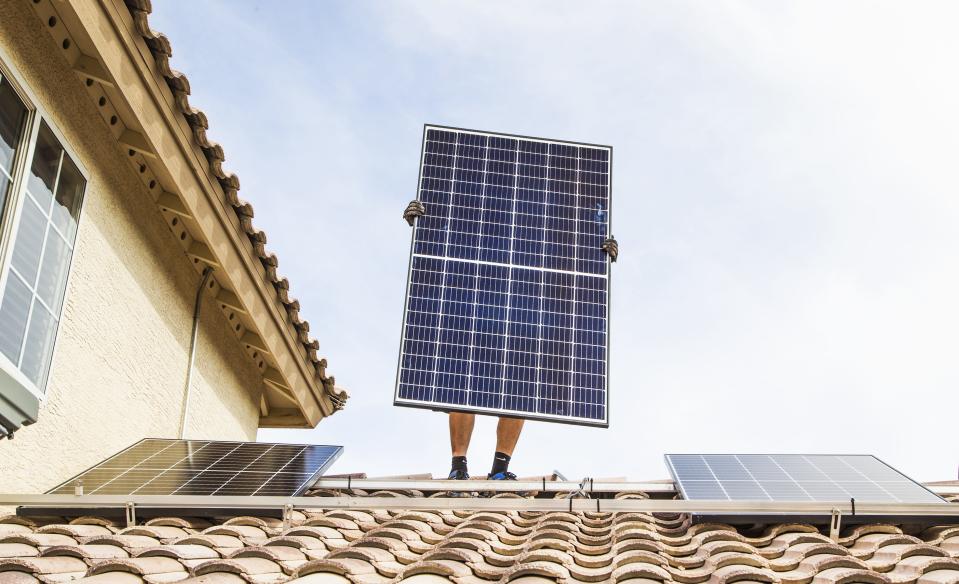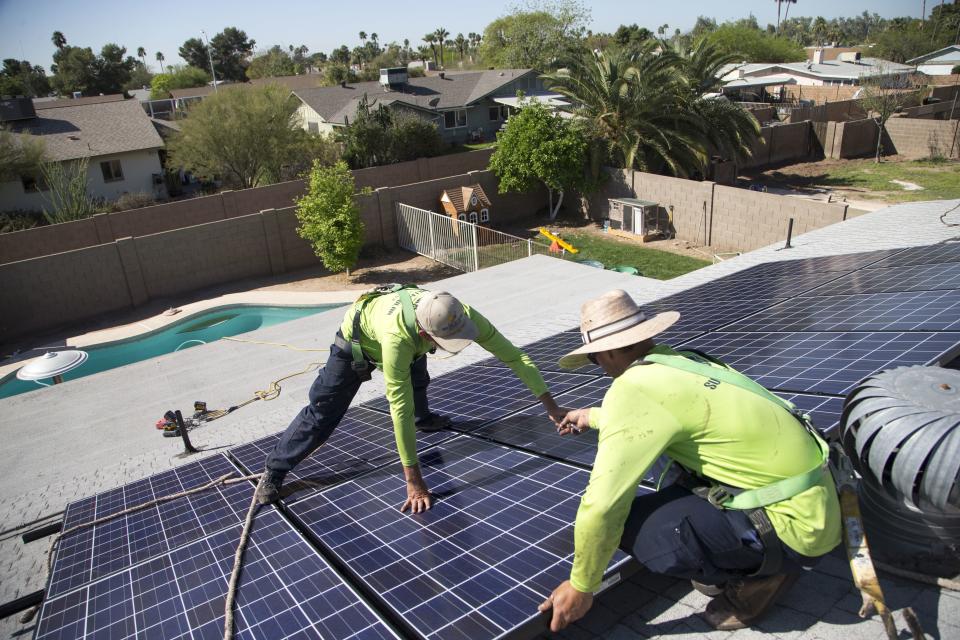Corporation Commission reopens 'value of solar' rate discussions despite strong opposition
- Oops!Something went wrong.Please try again later.
- Oops!Something went wrong.Please try again later.
The Arizona Corporation Commission has voted 3-2 to revive discussions about how rooftop solar owners are compensated for excess energy, a contentious "zombie" issue often referred to as "the value of solar."
The proposal to reconsider utility buyback rates again squeaked out a majority vote late Wednesday with Commissioners Nick Myers, Jim O'Connor and Kevin Thompson in favor and Lea Márquez Peterson and Anna Tovar against. The Corporation Commission regulates some utilities in the state, including some electricity providers.
The result came as a surprise to some after five hours of passionate public comment from nearly 50 people at the meeting and hundreds of letters filed in advance seemed to suggest widespread local opposition to cracking open this embattled debate. In contrast, only four public commenters and around a dozen letters expressed any measure of support. The existing policy, known as decision 75859, was established in 2017 after years of deliberation and at least $50,000 of taxpayer funds spent on consultant fees.
Central to the issue is the 10% annual reduction in how much utility companies must pay residential solar panel owners for extra energy produced by their home system that is then returned to the grid and sold to other customers. The decision also reopens discussions about the 10-year export rate effective period and a grandfathering policy for net metering customers.
Myers said during the meeting that he doesn't expect rates to change for existing solar customers. But Tovar noted that this could depend on how long the next cycle of debates takes and who remains on the commission after the next election cycle.
Background on the 2016 rate discussions: Arizona utility regulators weigh the value of rooftop solar
Those in support of reopening the decision argue that, since the nationwide cost of solar is decreasing rapidly as it becomes more commonplace, buyback rates should be unlocked to respond to this market fluctuation, theoretically preventing energy costs from going up for consumers without rooftop solar.

But a 2017 study found this cost disparity to only be likely "in places where many people install solar and utilities compensate people generously for their excess generation." By most accounts, that description does not include Arizona.
Workers, business owners oppose 'the value of solar' zombie's return
The lack of generous compensation from local utilities was underscored by several new and longtime homeowners with rooftop solar who spoke at Wednesday's meeting in opposition to reopening the buyback rate decision.
Many expressed concerns about their investment in the technology not paying off as promised if the commission decided to reduce what utilities must pay them for solar energy sold back to the grid. Some mentioned that the option to store their excess energy themselves, affording independence from rate fluctuations, is not yet reasonable due to high battery costs and limited availability.
While it is possible a renegotiation could result in rate changes in either direction, numerous commenters and legal experts expressed strong doubts the outcome would favor solar expansion.
A steady stream of solar workers and small business owners also spoke out against opening the door to changes, arguing that companies and customers already face high volatility in the solar industry that complicates financial planning, growth trajectories and sales to homeowners confused about the long-term benefits of installing rooftop solar.
As of 2020, about 8,400 Arizonans worked in solar energy jobs. That number is expected to roughly double by 2030, in part thanks to worker training opportunities and solar incentives put into place by President Joe Biden's 2022 Inflation Reduction Act. But solar workers at Wednesday's meeting voiced concerns that reopening rate discussions could stunt that growth by eroding confidence in the process.
One year ago: Solar jobs are coming to Arizona, and environmentalists, economists and engineers can't wait
Speaking to commissioners while wearing his work shirt, Donald Duir, who owns a solar design company, said he believes in the benefits of solar to individuals and society but has struggled to survive periods of uncertainty about its future. Sometimes his services will be booked out a year in advance, he said. At other times he's left worried about landing jobs and paying bills. He blamed instability in incentives and buyback rates for dissuading customers from committing to solar. He said he hopes to stay in Arizona and that the solar industry will continue to grow and create local jobs, but that ongoing deliberations about "the value of solar" destabilize that path.
"I have been on this 'solarcoaster' for a long time, and this is getting really old," Duir said. "(Decision 75859) gave us stability. It gave our family stability, it gave our income stability, it gave the grid stability. It just gave everything stability: job growth, tax revenue, statewide stability. It was getting better. We could actually get off the 'solarcoaster' and take a breath. But now here we are, again."

Perspectives on tradeoffs, the planet and 'a fly on an elephant'?
Opposition came in hordes from environmentalists. Many worried about how undead deliberation over the number of pennies solar customers deserve per kilowatt produced at home would kill conversations about the essential value of a statewide transition to renewable solar as a way to address climate change.
As of 2022, the U.S. Energy Information Administration calculated that Arizona gets 42% of its total electricity net generation from natural gas, 12% from coal and only 10% from solar sources, a low number considering that experts see energy from the sun as one of the state's greatest natural resources and areas for potential economic growth. Solar advocates have blamed Arizona's lack of investment in solar on high fees and stingy incentives maintained by utility companies.
One such solar expert, Arizona State University professor and legal scholar Troy Rule, responded to Wednesday's vote by telling The Republic that he is "very wary about this new development at the AZCC, which threatens to make a policy that’s already unfriendly to rooftop solar even less friendly."
A couple of commenters drew attention to environmental impacts and human rights violations associated with the mining and manufacturing of solar panels. A 2022 report from the hundreds of scientist members of the Intergovernmental Panel on Climate Change, however, concluded that despite these acknowledged harms and tradeoffs, reducing reliance on fossil fuels as an energy source is the most important and straightforward step toward limiting the widespread human suffering, worsened drought, extreme weather, crop failures and other costly climate impacts linked to a rise in global average temperatures.
"We are extremely disappointed that the Arizona Corporation Commission decided to move forward with plans to make rooftop solar less economical and less accessible for many Arizonans," Sandy Bahr, director of the Sierra Club's Grand Canyon chapter, told The Republic Wednesday.
"The compensation rates for providing electricity from your solar rooftop to your utility are already below the average wholesale price for electricity, so utilities are getting a good deal and people without solar are not subsidizing it," Bahr said. "By moving forward with this action, the majority on the Commission are signaling that they are hostile to solar energy and would rather see ratepayers pay through the nose for expensive coal and gas."
More: As Arizona builds to solve a housing crisis, will its homes withstand future heat extremes?
Myers, who proposed the agenda item, dismissed the notion of his potential hostility toward solar. He also declined to recuse himself from voting on it after Bahr and others argued he had shared biases in favor of utility profits on social media.
O'Connor commented before voting "yes" that no matter the outcome of a rate renegotiation, the overall impact would be so small compared to all the other forces influencing solar development as to be "a fly on an elephant's ass." So why not open it up, he argued.
Thompson gave a longer, more suspenseful and nuanced speech addressing the opposition before also voting to reopen the measure. Peterson and Tovar cited the importance of solar market stability and the environment before casting their 'no' votes.
Joan Meiners is the climate news and storytelling reporter at The Arizona Republic and azcentral.com. Before becoming a journalist, she completed a doctorate in ecology. Follow Joan on Twitter at @beecycles or email her at joan.meiners@arizonarepublic.com. Read more of her coverage at environment.azcentral.com.
Sign up for AZ Climate, The Republic's weekly climate and environment newsletter.
Support climate coverage and local journalism by subscribing to azcentral.com at this link.
This article originally appeared on Arizona Republic: Corporation Commission reopens debate over rooftop solar buyback rates

